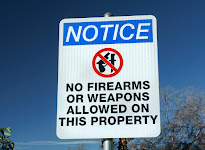In recent years, we have witnessed many
tragedies with respect to guns in the workplace. Regardless, civilians have the right to
bears. While this might not be a fundamental right, the right to
bear arms is a derivative and constitutional right, according to LaFollette
(2007). Firearms are used for
protection, hunting, collecting however there seems to be constant concern
about civilians owning firearms and even more controversy over citizens
carrying guns in the workplace. Are guns really that dangerous? Are there really that many fatal workplace
shootings? Although any loss of life is
tragic, the statistics for workplace disasters regarding guns highlight how the
focus on gun control for private citizens may be skewed.
According to a Census of Fatal Occupational
Injuries, by the U.S. Department of Labor (2019), there were 453 occupational
shooting homicides in the United States in 2018. Moreover, 351 of those were intentional
shootings by other persons (U.S. Department of Labor, 2019). That’s a mere 6% of total workplace fatal
injuries in 2018 whereas almost 40% were caused by transportation
incidents. Consider this, our society
requires one to study a handbook and take practice tests at the DMV, pass the
learner’s permit test, log a certain number of hours with licensed driver, pass
a driving (road) test, and drive with certain restrictions until the member
reaches “maturity”. Even with all this
preemptive training and restrictions put in place, not to mention specific
workplace training and guidelines, vehicular workplace fatalities are far surpassing
those of fatal workplace shootings.
 |
While the statistics prove that workplace shooting fatality numbers dim in comparison to vehicular fatalities, perhaps guns should be prohibited from civilian workplaces. Businesses are required to maintain safe workplaces. If civilians are bringing firearms to work and creating an (potential) unsafe environment for others, they need to be restricted. I am a female working in aircraft maintenance. There are certain basic rules that I must follow in order to stay safe on the flight line. For example, I must constantly keep my hair pulled back so as not to snag on equipment, I am prohibited from wearing jewelry to prevent from getting injured climbing stands/ladders, and I am prohibited from wearing a hat or wig on the flight line to reduce the possibility of it being sucked into a jet engine. These restrictions do not mean I can never wear my hair down, jewelry or hats; I just cannot do these at my workplace due to safety concerns. The same argument can be made for guns in any or most workplaces. There could be a concern of accidental discharge or worse, someone losing their temper at work while having easy access to their weapon and using it. Organizations must weigh the pros and cons of allowing firearms at work with the potential risks. Therefore, guns should be prohibited from civilian workplaces.
Lafollette, H.
(2007). The practice of ethics. Malden, Mass: Blackwell.
U.S. Department of Labor. (2019, December 17). TABLE A-2. Fatal occupational injuries resulting from transportation incidents and homicides, all United States, 2018. Retrieved July 22, 2020, from https://www.bls.gov/iif/oshwc/cfoi/cftb0323.htm


No comments:
Post a Comment